這年頭,老外都會毛筆字和武術(shù)了?看,他們來“獻(xiàn)丑”了!
來源:環(huán)球時(shí)報(bào)英文版
2018-10-04 14:43:10
用電腦和手機(jī)多了,時(shí)常會有“提筆忘字”的情況。
主頁君的字就寫得挺難看,老被家里人笑話。
什么……還問毛筆字……??
現(xiàn)在的年輕人,除了考試,寫漢字的機(jī)會是越來越少了。
至于練毛筆字的,那更是鳳毛麟角。
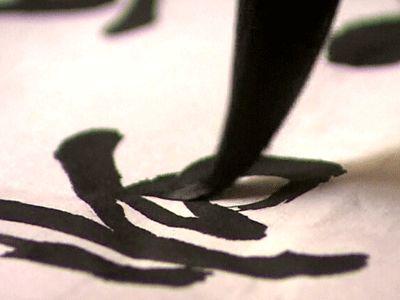
但是呢,前陣子有200多名國外的留學(xué)生 來到上海,在一所高校里進(jìn)行了三周的學(xué)習(xí)體驗(yàn)。他們接觸的其中一門課就是——
寫!書!法!
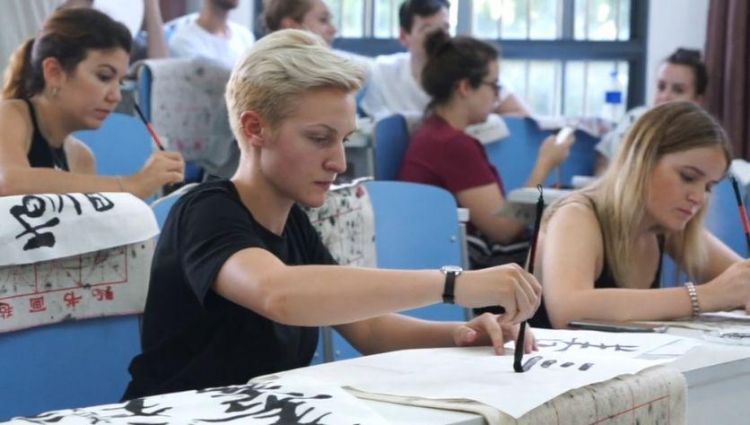
等等……怎么還要寫biangbiang面的"biang" ……
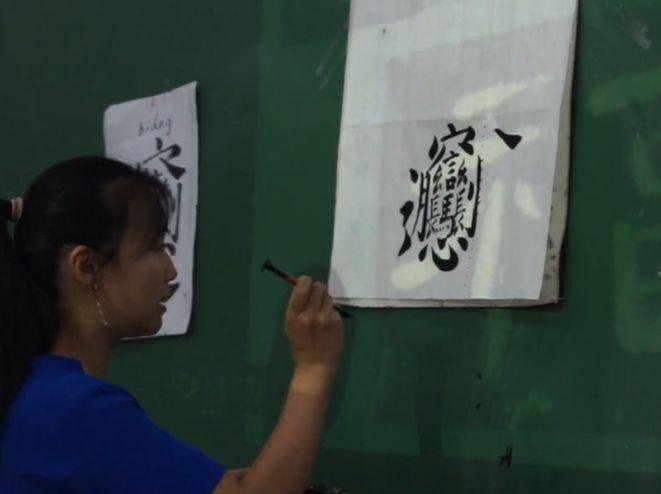

……這超綱了啊大兄dei!

戳視頻,看外國小伙伴是怎么寫書法 的吧——
我們問了幾位留學(xué)生小姐姐:你覺得書法寫起來咋樣?
小姐姐們的回答也都是真愛了~~
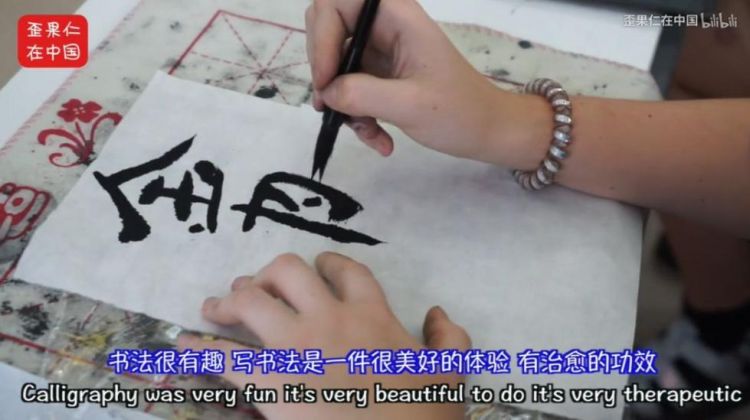
▲書法比較容易,讓人放松
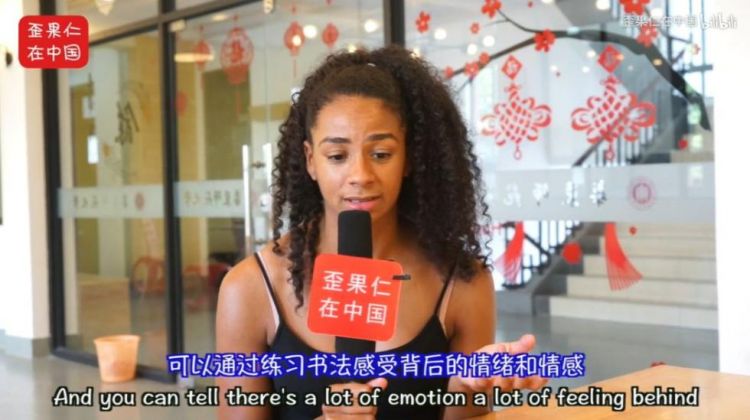
▲寫書法很美好,很治愈
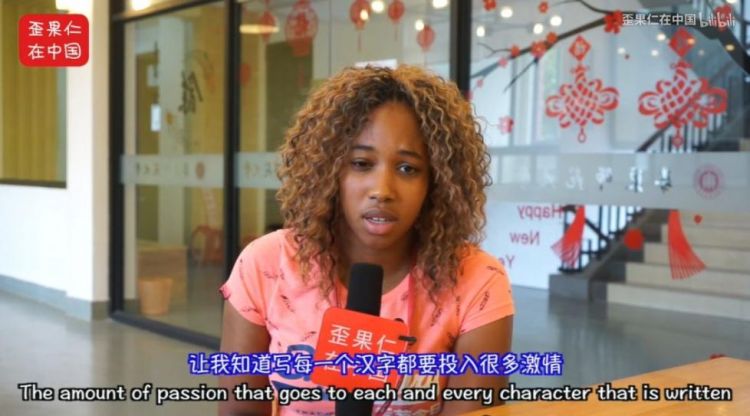
▲通過寫書法,可以感受漢字背后蘊(yùn)含的情感

▲寫每一個(gè)漢字都需要投入激情

(圖via網(wǎng)絡(luò))
除了書法之外,這些外國年輕人們還體驗(yàn)了另一項(xiàng)博大精深的中國傳統(tǒng)文化—— 武術(shù) 。
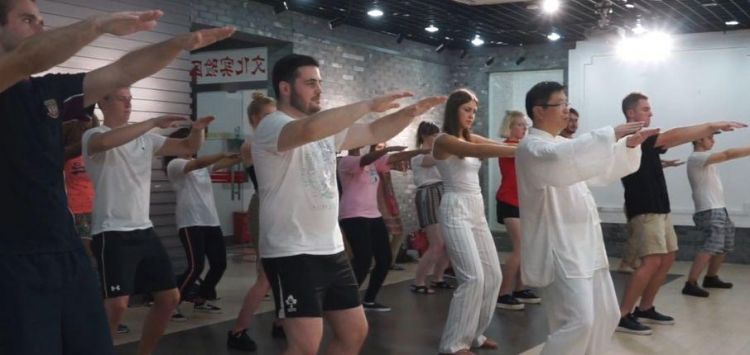
和需要靜心端坐的書法相比,武術(shù)則讓大家能“動(dòng)” 起來。

來看看他們是咋練太極的——
和西方的許多格斗派系不同的是,咱中國的太極講究“以柔克剛” ,以不變應(yīng)萬變,其中蘊(yùn)含著深厚的東方哲思。
西方的小伙伴們能get到太極的精髓嗎?他們是否期待學(xué)習(xí)呢?
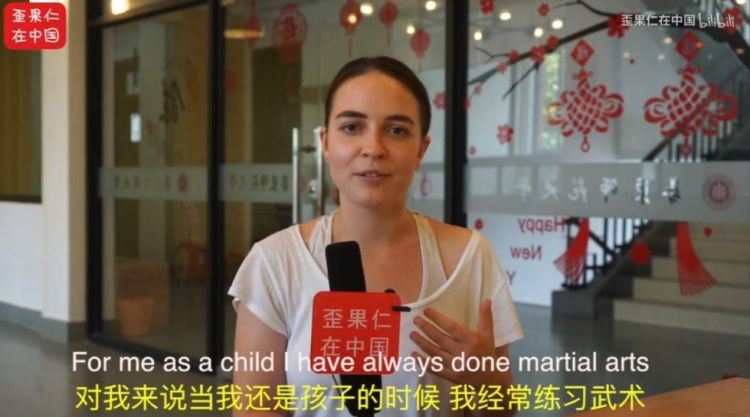
▲太極非常有意思

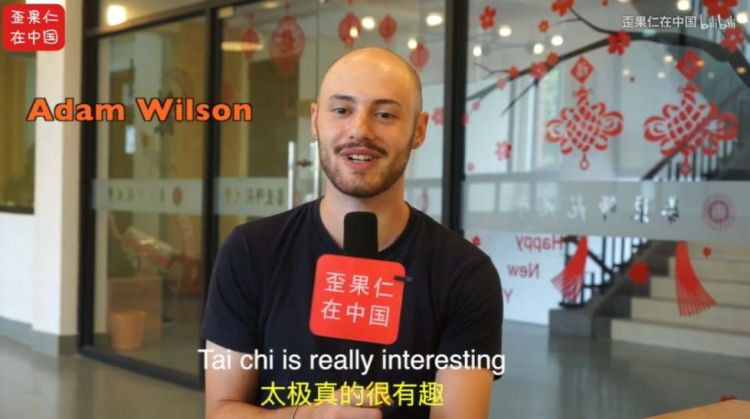
▲從小就練習(xí)武術(shù)了,太極是最有意思的

▲太極真的很有趣

▲以前從沒體驗(yàn)過太極,感覺太棒了

▲體驗(yàn)太極很有意思
(武俠小說里的東西還是沒有的,切記……
)
Studying up on Shanghai
"Good job!" Wang Kai, a young Chinese calligraphy teacher complimented her foreign students for writing the character "Fu" using the correct strokes.
These students, who are all from UK universities, are attending a Study China program held in East China Normal University (ECNU), where they are learning Putonghua, calligraphy, tai chi and Chinese history for three weeks. They also have a chance to visit tourism sites like the Bund and experience normal daily life with a Shanghainese family. The program will finish at the end of August.
It is the 11th year for the university to host the program, with 220 students from the UK coming to ECNU this year. The Global Times had a chance to sit in on their lessons and talk to some of them.
Most are in China for the first time, and some were expecting it to be very traditional. All were surprised by just how developed Shanghai is. "It's nice to see how modern China has become, and how global a city like Shanghai really is now," 21-year-old Tiffany Campbell, a student from University of the West of England, told the Global Times.
When Campbell first arrived in China, she thought there was something wrong because many Chinese people were looking at her. But she soon realized that they were just happy to see her. "I don't have any ill feelings [about being stared at], as everyone is so warm and nice."
Many of these students have taken it upon themselves to chat with the locals they catch staring at them. Manisha Thind, a 19-year-old student from UCL (University College London), had a conversation with a Chinese father and his son, who practiced their English with her as she practiced her Putonghua with them.
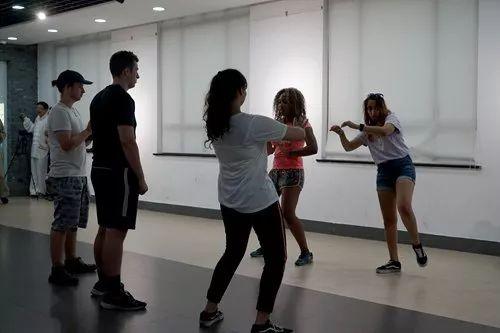
Intensive and difficult
During a tai chi class, the Chinese instructor describes the mantis, snake and dragon moves in English to help the students better understand them, though many still found tai chi difficult. Adam Wilson, for example, a 22-year-old student from the University of Leeds, has learned martial arts in different countries, but this was his first time attempting tai chi.
"It's much slower and feels more intensive. And more self-reflecting," Wilson told the Global Times, who added that their tai chi instructor also taught them the history of the ancient martial art and why so many Chinese people can be seen practicing it in the park every morning.
Bethan Watson, 23, from University of Exeter is also fascinated by martial arts and history and considered the opportunity to learn about tai chi "a great experience." But Watson admitted it would be a challenge for her to learn Putonghua.
In terms of calligraphy, Watson thinks the characters are filled with so much culture and history, but she also does not expect to be able to master the art. "My drawing is not so good. [Calligraphy] is the most difficult, and you have to have an appreciation for it."
Contrastingly, 23-year-old Natasha Carberry from the University of Bradford found writing calligraphy very relaxing. "Learning Mandarin [Putonghua] increases my level of knowledge and understanding of how [the language] has so many tones," Carberry told the Global Times.
However, most of the young interviewees said that Putonghua is really difficult to learn in just three weeks. "It's difficult for me speaking only English to listen and hear the differences," Campbell said, while 19-year-old Alan Kowalski, a student from University of Exeter, thinks Chinese is one of the hardest languages in the world, but also the most creative.
"It's unique compared to other languages. It's so different from anything that I have experienced," Kowalski smiled.
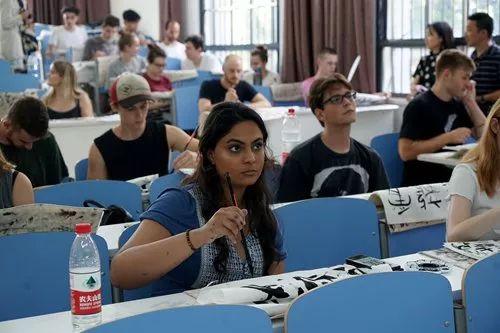
Challenging and useful
Danielle Fenton, 20, a student from Queen's University, studied several languages in the past but considers Chinese the most difficult, especially the tones and pronunciation.
"Today's class is quite challenging and useful, which talks about where we come from," Fenton said, adding that she hopes she can continue to learn Putonghua in China as it's now one of the most important languages in the world.
Kristen Buckle, 21 and from University of Exeter, shared the same opinion, saying that even though the tones and pronunciation are hard to master, the three-week course has been a good introduction for her. "I definitely will continue to learn the language [when I return to the UK]."
Among all nine students the Global Times interviewed, most showed an enthusiasm or interest in learning about Chinese culture, and hope to have further education or work opportunities in Shanghai after graduation. "To work in Shanghai would be a great opportunity," Wilson told the Global Times. "If I could work here, that would be amazing."
Thind said she definitely wants to work in China in the future, which was one of the reasons she chose this program in the first place. She told the Global Times that she made the right decision to participate in the program in order for her to experience the country first-hand.
"There are so many businesses in China, so there are many work opportunities here. It's also one of the leading economies in the world. So it would be brilliant to work here," Thind exclaimed.

Popular and growing
"Definitely, I will return here [China] after graduation. I've been learning Chinese and I hope I will be fluent one day, so the best way would be to work or study more in China," Charlotte Cattaneo, 22 and from UCL told the Global Times.
In 2017, 489,200 international students furthered their studies in China, an increase of over 10 percent for the second consecutive year, according to a note posted on the website of the Ministry of Education of China (MOE) in April.
The number of degree students reached 241,500 (49.38 percent of the total), up 15 percent year-on-year, according to the MOE.
An increasing number of foreign students are choosing to get their master's or PhD degree in China.
At the end of 2017, China had become the most popular destination for international students in Asia, according to the MOE.
Watson hopes she can use what she has learned in China thus far (culture, language) at the international level.
Carberry was glad that her family will also visit China next year with her.
"Hopefully I will see more of Shanghai, Hong Kong, Beijing. I really look forward to it."
Kowalski said he's a "city boy" and loves the hustle and bustle of big cities like London and Shanghai. But he is far more impressed by Shanghai's long history and culture.
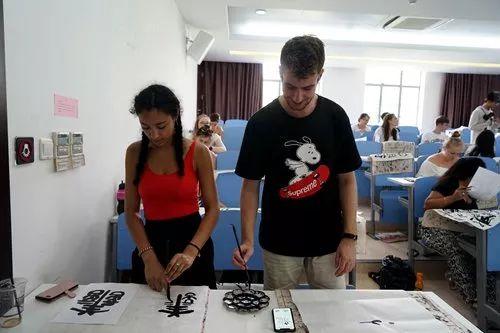

想爆料?請登錄《陽光連線》( https://minsheng.iqilu.com/)、撥打新聞熱線0531-66661234或96678,或登錄齊魯網(wǎng)官方微博(@齊魯網(wǎng))提供新聞線索。齊魯網(wǎng)廣告熱線0531-81695052,誠邀合作伙伴。

封壇酒不再是舊時(shí)堂前燕 飛入百姓家成為新常態(tài)
- 當(dāng)前白酒行業(yè)呼吁“本質(zhì)回歸”,實(shí)質(zhì)是“回歸傳統(tǒng),匠心釀造”的體現(xiàn),是消費(fèi)者對白酒的要求不再局限于交際,而是更加關(guān)注白酒背后所帶來的...[詳細(xì)]
- 中國新聞網(wǎng) 2018-10-04

遼寧凌源第三監(jiān)獄兩罪犯逃脫 逃跑時(shí)偷走獄警服裝
- 遼寧凌源第三監(jiān)獄兩罪犯逃脫。今日,遼寧朝陽市公安局發(fā)布消息稱,有兩名罪犯從凌源市第三監(jiān)獄逃脫。[詳細(xì)]
- 中國新聞網(wǎng) 2018-10-04
2022年北京冬奧會延慶賽區(qū)綜合管廊項(xiàng)目全面開工建設(shè)
- 2022年北京冬奧會延慶賽區(qū)綜合管廊項(xiàng)目4日全面開工建設(shè)。這是我國首次采用TBM(硬巖掘進(jìn)機(jī))施工的地下綜合管廊工程,也是TBM在北京的首次...[詳細(xì)]
- 新華網(wǎng) 2018-10-04
湖北警方嚴(yán)打長江流域涉黑涉惡違法犯罪護(hù)生態(tài)
- 記者4日從湖北省公安廳獲悉,湖北警方通過嚴(yán)打長江流域涉黑涉惡違法犯罪,有力推動(dòng)了生態(tài)環(huán)境保護(hù)工作,近兩年中,警方已破獲相關(guān)刑事案件4...[詳細(xì)]
- 新華網(wǎng) 2018-10-04
走近云端上的安全守護(hù)者
- 凌晨4點(diǎn)50分,一束光劃破山間的霧氣,伴隨著耳邊呼呼的風(fēng)聲,姚文華和工友們又乘著敞篷的索道檢修車,開始了一天的忙碌。“線路全長2666米...[詳細(xì)]
- 新華網(wǎng) 2018-10-04

國慶第三天云南旅游升溫 西雙版納住宿率超80%
- 西雙版納住宿率超80%圖為國慶長假游客在云南游玩。記者從云南省旅發(fā)委獲悉,3日,國慶“黃金周”第三天,云南旅游市場運(yùn)行呈穩(wěn)定上升趨勢,...[詳細(xì)]
- 中國新聞網(wǎng) 2018-10-04

三亞旅游熱度持續(xù)升溫 旅游市場秩序井然
- 三亞旅游熱度持續(xù)升溫。旅游市場秩序井然圖為游客在亞龍灣熱帶天堂森林公園游覽。[詳細(xì)]
- 北京晚報(bào) 2018-10-04

雪夜救援:折多山連降大雪路面結(jié)冰 千余車輛被困
- 折多山連降大雪路面結(jié)冰。千余車輛被困。[詳細(xì)]
- 中國新聞網(wǎng) 2018-10-04

國慶長假數(shù)萬民眾陶醉在徐州文化博覽會
- 國慶長假數(shù)萬民眾陶醉在徐州文化博覽會文博會非遺展區(qū)人潮涌動(dòng)。孩子們與家長一起體驗(yàn)制作陶器的快樂。[詳細(xì)]
- 廣州日報(bào) 2018-10-04

西湖網(wǎng)紅打卡地 “西湖志愿者”來守護(hù)
- 西湖網(wǎng)紅打卡地。10月2日晚上7點(diǎn),杭州湖濱三公園西湖音樂噴泉前的小廣場,人潮涌動(dòng)。[詳細(xì)]
- 中國新聞網(wǎng) 2018-10-04

西藏登山大會多項(xiàng)活動(dòng)啟動(dòng)
- 西藏登山大會多項(xiàng)活動(dòng)啟動(dòng)圖為登山愛好者攀登洛堆峰。以“保護(hù)冰天雪地、發(fā)展登山運(yùn)動(dòng)”為主題,第十六屆中國西藏登山大會3日在拉薩當(dāng)雄縣...[詳細(xì)]
- 中國新聞網(wǎng) 2018-10-04

航拍廣西侗鄉(xiāng)程陽八寨景區(qū) 侗寨美如田園詩畫
- 航拍廣西侗鄉(xiāng)程陽八寨景區(qū)。蔣雪林。[詳細(xì)]
- 中國網(wǎng) 2018-10-04

民宿刷單套路:有客棧一天花上千塊 一條好評3到10元
- 有客棧一天花上千塊。但她驚訝地發(fā)現(xiàn),同一景區(qū)新開業(yè)的一家客棧,剛剛兩個(gè)月評論就有100條,在平臺上的排名一路領(lǐng)先。[詳細(xì)]
- 新華社 2018-10-04
















網(wǎng)友評論僅供網(wǎng)友表達(dá)個(gè)人看法,并不表明齊魯網(wǎng)同意其觀點(diǎn)或證實(shí)其描述我來說兩句